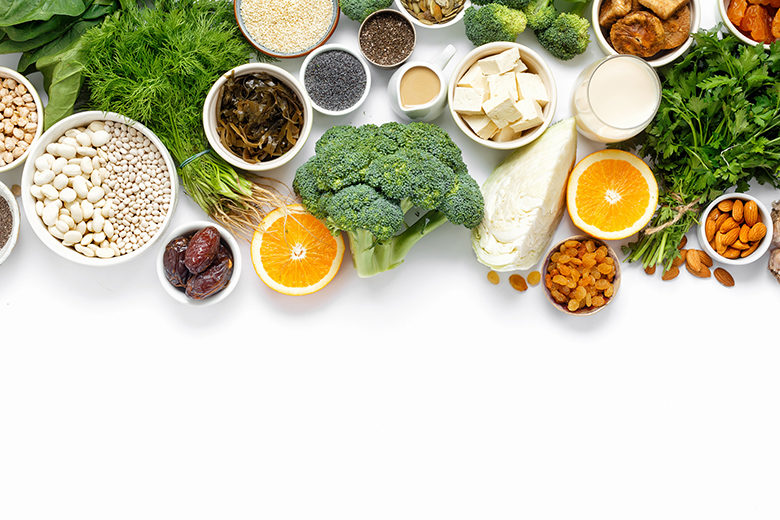
Have you considered your bone health lately? Many of us don’t until we learn for the first time that our bones are thinning — known as osteopenia, it’s a condition that precedes osteoporosis. Osteoporosis is a disease with huge health care costs and potential morbidity. Being proactive means doing all we can toward prevention, including evaluating our diet, lifestyle and any supplements we use to improve bone health. Following are some key nutrition players for strong bones.
Calcium
The most studied mineral for prevention of osteoporosis and fractures. Most of us need between 1,000-1,200 milligrams of calcium daily in adulthood. While many rely solely on supplements, the diet can contribute impressive amounts. Obviously there’s dairy, but other good sources include green leafy vegetables, almonds and canned salmon. Knowing how much of your calcium intake comes from your diet helps determine how much extra you may need from supplements — and might be less than you thought.
Vitamin D
A key player in the absorption of calcium and partner in decreasing fracture risk. Vitamin D may also strengthen muscles and help prevent falls. This “sunshine vitamin” is present in most calcium supplements. Fortified dairy and cereals, egg yolks, salmon and vegetable oils are dietary sources, but many people get little from the diet. It is worthwhile to have your levels checked to make sure your vitamin D stores are adequate. While the recommended daily amount varies between 400-1,000 International Units (IU) based on the reference you use, many contend that this intake is too low. Consider your level, dietary sources, sun exposure and how much vitamin D is in your calcium supplement before deciding how much you need from a daily supplement.
Protein
It is accepted that excessive intakes of protein can lead to weaker bones due to urinary loss of calcium. Did you know that low protein intake also leads to a negative calcium balance? Some people, including the elderly and some women who chronically diet, do not eat enough protein. Around 1 gram protein per kilogram of body weight will strengthen bones when our calcium and vitamin D intake is adequate. This may be a nutrient needing more attention for better bone health. Good sources include lean animal meats as well as plant proteins such as soy and legumes.
Fruits and vegetables
We all know the disease-fighting benefits of eating more than five a day. Osteoporosis is one of those diseases. Studies have shown that populations with higher fruit and vegetable intakes have reduced bone loss and better bone density. These foods — and plant-based diets in general (think DASH , New American Plate, etc.) — contain numerous protective compounds including potassium, vitamin C, carotenoids, magnesium and vitamin K. All of these are important players in neutralizing bone-robbing acids, building up and strengthening our bones.
Salt, sugar and caffeine
Excessive sodium causes us to lose bone protective minerals in our urine. Many overdo this mineral by eating processed and fast food too often. Increased intake of sweets may also lower bone mineral density as they replace healthier foods in the diet. Finally, caffeine in high amounts (more than 3 cups daily) may contribute to calcium loss from the body.
The way we eat has huge power to protect and strengthen our bones. It’s worthwhile to occasionally take inventory of our diet and consider changes we can make to lower our risk for osteoporosis, not to mention take better care of this body we carry around daily! While supplements play a supporting role, they will never take the lead over a plant-based diet rich in fruits and vegetables and regular physical activity.


